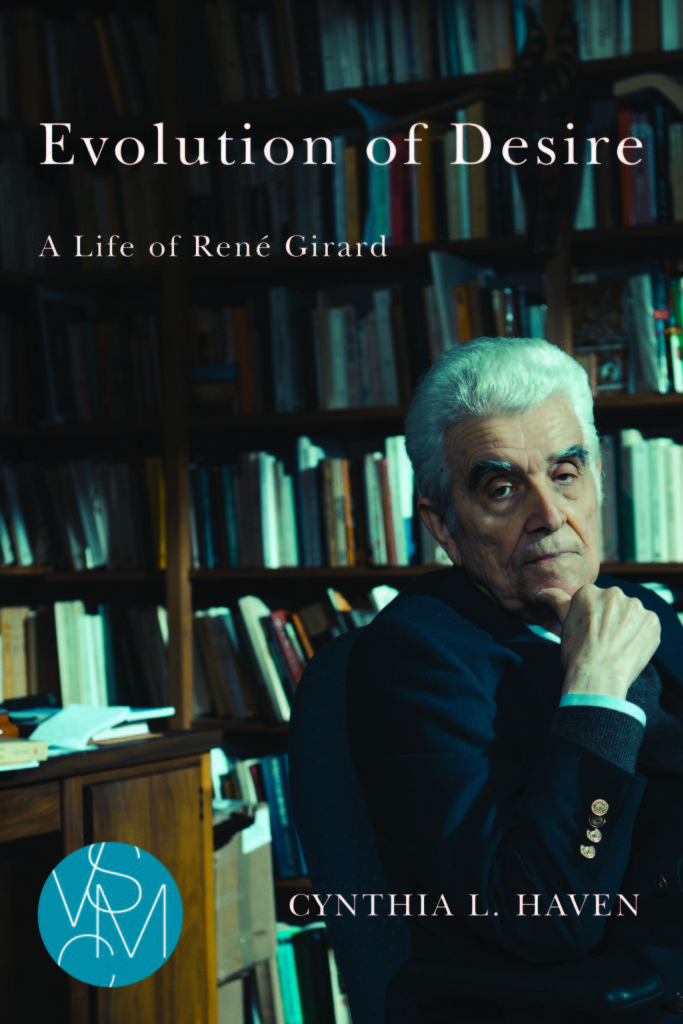 Up at Quarterly Conversation, an excerpt from my Evolution of Desire: A Life of René Girard – to serve as appertif. The book will be officially out in April, and our kindly friends over at QC wanted to run an excerpt. Instead it became a whole chapter! “The French Invasion” describes a few wild days at Johns Hopkins University in 1966:
Up at Quarterly Conversation, an excerpt from my Evolution of Desire: A Life of René Girard – to serve as appertif. The book will be officially out in April, and our kindly friends over at QC wanted to run an excerpt. Instead it became a whole chapter! “The French Invasion” describes a few wild days at Johns Hopkins University in 1966:
The conference has been called “epochal,” “a watershed,” “a major reorientation in literary studies,” “the French invasion of America,” the “96-gun French dispute,” the equivalent of the Big Bang in American thought.
To hear the superlatives, one would have thought that “The Languages of Criticism and the Sciences of Man” symposium held at Johns Hopkins for a few frantic days from 18 to 21 October 1966 was the first gathering of its kind ever held. It wasn’t, but it did accomplish a feat that changed the intellectual landscape of the nation: it brought avant-garde French theory to America. In the years that followed, René Girard would champion a system of thought that was both a child of this new era and an orphan within it. He was at once proud of his role in launching the symposium, and troubled by some of its consequences.
René Girard was one corner of the triumvirate that instigated the conference, and the senior member of the trio. The others were his Johns Hopkins colleagues Richard Macksey (well, he will be familiar to Book Haven readers. We’ve written about him here) and Eugenio Donato. Donato was one of those rare birds in academia who “had a nose,” according to a French expression Dick Macksey borrowed. “He knew where the cooking was taking place.”
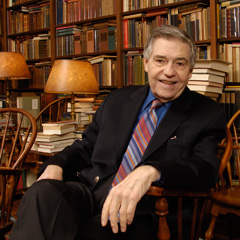
Dick Macksey: he’s left to tell the tale.
Only in the New World could such a meeting occur—certainly not in Paris, with its rivalries, tensions, and tectonic shifts. “The odd thing about it is, this struck me at the time even, these folks would not have gotten together under any circumstances in Paris under the same roof. There were enough lines already drawn in the sand, or drawn in blood, or whatever. So, a neutral ground,” Macksey explained.
The symposium was intended to be a crowning achievement for structuralism, but here’s the surprise: it signaled its end instead, as the movement slid into post-structuralism, so smoothly and effortlessly that the leading structuralists tend also to be the leading post-structuralists—Lacan, semiotician Roland Barthes, philosopher Michel Foucault, among them. The dark horse, Algerian-born Derrida, delivered the very last paper of the symposium, challenging the work of Lévi-Strauss and impishly skewering the structural weaknesses in the towering edifice the maestro had built. The paper, still a much-read classic of French theory, made the young philosopher’s reputation in America and everywhere else. America, not France, would become ground zero for the “deconstruction” he introduced.
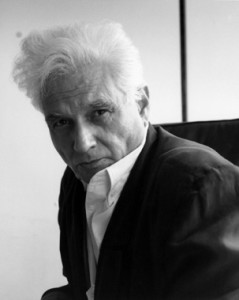
Dark horse Derrida.
Everyone afterward sensed that there had been a metamorphosis. “It wasn’t clear whether it was a wedding gown for structuralism in America, or a winding sheet for structuralism in America,” Macksey told me. “Did we know what had happened? No, but there was a sense.”
In my conversations with him, Girard was consistently contemptuous about “la peste,” describing it as a kind of star thistle that had taken root across the United States and proved impossible to eradicate.
(Note bene: there have been a few adaptations to the text to accommodate names mentioned in earlier chapters and Quarterly Conversation style. Buy the book for all the footnotes!)
Anyway, the Quarterly Conversation piece is creating quite a conversation on Twitter.
Here’s one early reaction:

She’s referring to Laurent Binet’s The Seventh Function of Language (2015), which L’Express called “the most insolent novel of the year.” Insolent? Humble Moi?
Well, I’ll include a few more social media reviews, and let you read the whole Quarterly Conversation piece, here. Meanwhile, you can find us over at Twitter.
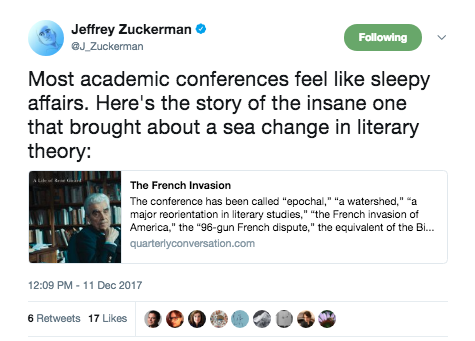
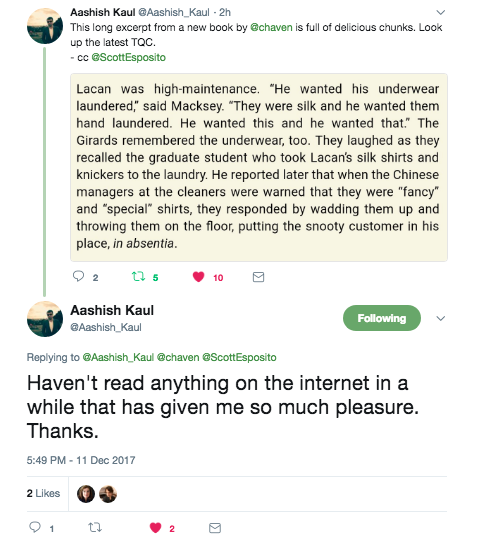
Tags: Eugenio Donato, René Girard, Richard Macksey

December 15th, 2017 at 10:46 am
Cynthia Haven says:
” A reasonably educated Frenchman has the vocabulary for abstract philosophical discussion, and can tinker with these concepts in a way most Americans cannot.”
And I have to add, honestly, sincerely, in the most scholarly spirit of fellowship; I believe that Cynthia Haven is dreaming.
She has swallowed the great American myth about the French, including French thinkers, whole, without a soupçon of critical thinking. I seriously question her claimed in-depth knowledge of “reasonably educated Frenchmen” — the kind I have met throughout my life and come to disbelieve deeply.
I am not the only disbeliever, far from it. And if I became a disbeliever of French intellectual arrogance, “jeux de manchettes”, and obscure-sounding charlatanism, it’s because I have been educated exactly the same way as all those “great” French thinkers and sophists, whose elucubrations and ratiocinations have become the bread-and-butter of many American cultural analysts. There are thousands of them in the States, and each one has to justify his or her existence by finding something new to “analyze” and publish.
It is a miracle that Cynthia Haven didn’t mention in her article the name of my direct “tutor”, Louis Althusser. But she mentions most of the others who impregnated my mind and imagination in my 20s. Most of whom have been able to sell their intellectual and philosophical stuff to American buyers. “Caveat emptor” applies as well to the cultural commerce.
The reasons for prudence and caution are not obvious, but they can be identified, sources, and exposed. But they are most understandably unwelcome to those analysts whose own brilliance, status in life, and careers derive from their devotion to cultivating that little patch of bizarre academic intellectual gardening.
ROO BOOKAROO, Dec. 17, 2017
December 19th, 2017 at 3:21 am
I was an undergraduate at Johns Hopkins from 1965 to 69 (and then I did a master’s in Humanities). During freshman orientation Girard gave a lecture on – I don’t know what the topic was, but he talked about cultural relativism. Strangest thing I’d ever heard, coming from backwoods Pennsylvania – not really, it was a small city in Western PA, Johnstown, but it might as well have been the backwoods.
So I was on campus for the infamous structuralism symposium, though I didn’t attend and didn’t even know it was happening. By that time, however, I had come to orbit one of the organizers, Dick Macksey, so I was steeped in the structuralism/semiotics milieu at Hopkins. I remember reading Catherine Macksey’s early translation of the Derrida piece in one of Macksey’s classes. Several years later, after I’d completed my masters with a thoroughly structuralist thesis about “Kubla Khan” directed by Macksey, I went off to the English Department at SUNY Buffalo for my Ph.D. And, of course, I encountered both Girard and Donato there, though I didn’t study with either of them. There was a well-developed two-way “pipeline” between Hopkins and Buffalo at the time, with students and faculty moving in both directions.
Of course, as Macksey mentioned in the excerpt, no one really knew what was going on at the time, but we did feel that something important was going on. Whatever it was, it has know been thoroughly absorbed into the academic system. In fact, in 1985 (I believe) J. Hillis Miller was lamenting the demise of deconstruction before the annual meeting of the Modern Language Association.That may have been a bit premature, though not by much. The fact is, most of what flies under the banner of deconstruction has at best a tangential relationship with Derrida.
Now the profession is scrambling around for ideas and, as far as I can tell, not finding much. To be sure, there IS computational criticism, which I find very interesting. I could go on and on about that – and have done so here and there on my blog, New Savanna – but the profession doesn’t quite know what to make of it, nor for that matter, do the computationalists themselves know. So, it’s all up in the air. There’s no way to tell what seeds will take root and flower and which will land on sterile ground.
December 19th, 2017 at 9:07 pm
What a delightful and informative post, Bill! Thanks for checking in.
December 19th, 2017 at 11:03 pm
Roo Buckaroo evokes palpable empathy in her/his remarks (above), even though the first three paragraphs sound a lot like the garden-variety complaints of any disillusioned, former true-believer who has yet to recover equilibrium after a near-fatal shock caused by “the god that failed.” But with Roo’s line, “It is a miracle that Cynthia Haven didn’t mention the name of [his] direct ‘tutor’, Louis Althusser”, my own empathy emerged as Roo Buckaroo’s experience came into focus. For who wouldn’t feel intellectually betrayed, professionally bamboozled, spiritually robbed, and in every way deceived–by the kinds of revelations that emerged about the wife-murdering, lunatic-asylum inmate, and suicide Louis Althusser, during the final years of his life? And even more damaging, perhaps, than the physical crimes just mentioned–in the tender heart of an acolyte: the revelation from the pen of the great Marxist Master-Thinker, Althusser himself: that he had never really read much of Karl Marx’s actual writing, and had not successfully navigated all the way through the actual pages of the latter’s *Kapital*? So I feelz for you, Roo Buckaroo–who WOULDN’T feel betrayed, disillusioned, abandoned by a Master . . . Culture? Well, no, it’s not France, nor the French in general, nor “French philosophers,” nor “French intellectual arrogance” that misled and betrayed you–it was Louis Althusser. A singular, sad case. No need for you, from your place of pain, to scapegoat a generalization, merely because you’ve been victimized by a pre-eminently perverse madman. “World-class expert on Marxism.” Nor is there any warrant for you to paint biographer Cynthia Haven with the same brush that plastered you: There IS a genuine distinction to be made between “a reasonably educated Frenchman” and “most Americans.” So I sincerely send you my condolences, Roo. Like a protagonist in a Greek tragedy or a novel by Balzac, you got caught in a twist of fate. as inexplicable as it is singular. When I saw your use of scare-quotes around the word “tutor,” I winced at the typographical scars, signs of the deeply cerebral wounds that your “tutor” Althusser laid on you, his “student” (i.e., victim). *Illusions perdues* probably wasn’t on his required reading list. I am sorry for that, too.
December 19th, 2017 at 11:09 pm
Please correct my unfortunate gaffe/typo: Rue “Bookaroo” for “Buckaroo,” passim. Apologies.